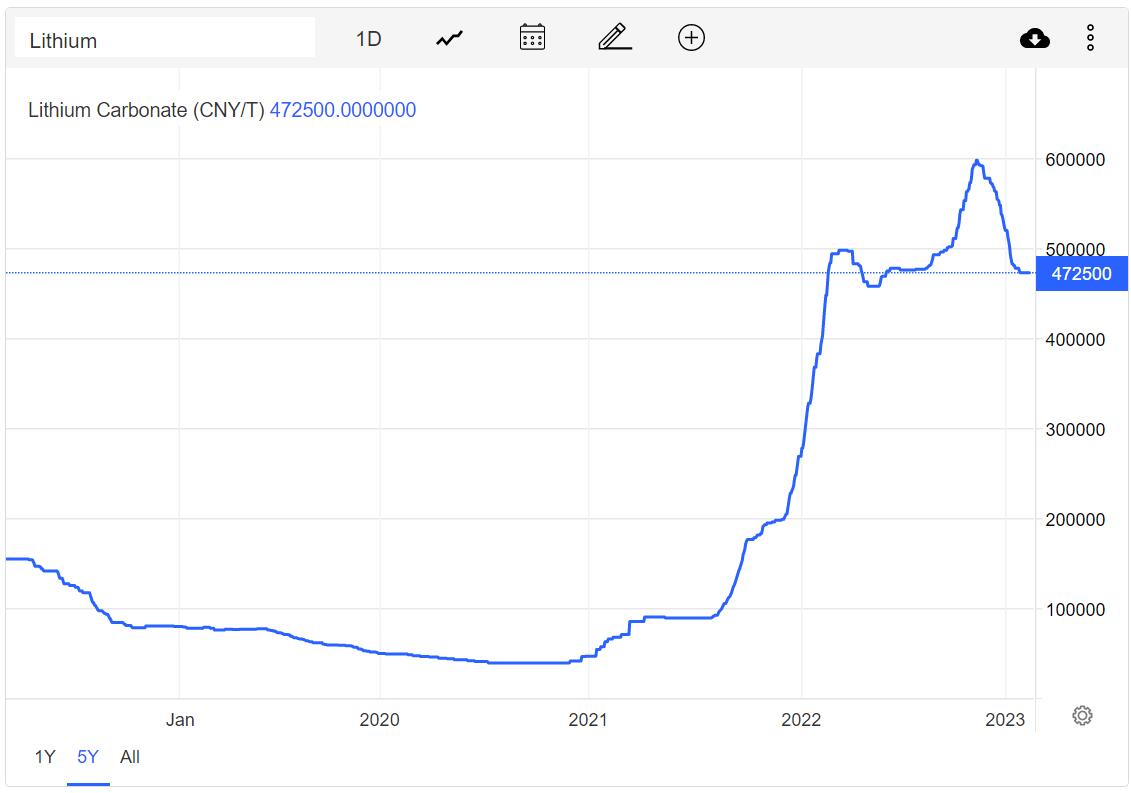Chinese Academy of Sciences academician Ouyang Minggao said he expects the price of lithium carbonate in China to drop to between RMB 350,000 yuan ($50,890) and 400,000 yuan per ton in the second half of this year.
Lithium carbonate prices have been falling since the end of last year, and there are still no signs of stopping the decline.
Ouyang Minggao, a member of the Chinese Academy of Sciences, said he expects the price of lithium carbonate in China to fall to about 350,000 yuan ($50,890) to 400,000 yuan per ton in the second half of this year.
Ouyang made the comments at an electric vehicle industry conference today, and the forecast implies that lithium carbonate prices will have room to fall by as much as 20 percent further in China this year.
Battery-grade lithium carbonate prices in China fell RMB 5,500 per ton today to an average price of RMB 440,000 per ton, according to My Steel. Industrial-grade lithium carbonate was down RMB 4,000 per ton, with the average price at RMB 412,500 per ton.
China's lithium-ion battery shipments are expected to be about 1 billion kWh this year, with growth rates set to drop sharply, Ouyang said.
The reason behind this is lower growth rates in the new energy vehicle (NEV) industry and lower demand for power batteries in lower-capacity models such as plug-in hybrids.
This will ease the pressure on the market for lithium-ion batteries, but to ensure the development of the battery recycling industry, a more reasonable equilibrium price range would be RMB 300,000 to RMB 400,000 per ton, Ouyang said.
With the rapid development of China's NEV industry, lithium carbonate prices have risen sharply in the past two years.
In November 2022, the price of battery-grade lithium carbonate in China briefly exceeded RMB 600,000 per ton. This was about 14 times the average price of about RMB 41,000 per ton in June 2020 and increased by about 55 percent from RMB 364,000 per ton in February 2022.
On March 26, 2022, Ouyang cited the soaring global demand for NEVs as the main reason for the sharp rise in lithium carbonate prices at a forum.
He also mentioned at the time that delayed capacity release on the supply side was also an important reason for the rise in lithium carbonate prices. The typical lithium carbonate capacity release cycle for ore production takes 3-5 years, while the capacity release cycle for projects that extract lithium from brine is 6-8 years.
Ouyang said last year that while the drivers of NEV sales growth will be there for the long term, the amplified demand for lithium resources brought on by panic stockpiling was temporary.
As supply capacity improves, lithium resources are expected to return to supply-demand balance in two to three years, he said at the time.
For EV makers, the rise in lithium carbonate prices has led them to bear higher battery costs.
If lithium carbonate prices stay this high, there would be a relatively big impact on Nio's gross margin, William Li, the company's founder, chairman and CEO, said in a conference call with analysts after announcing third-quarter earnings on November 10, 2022.
Every RMB 100,000 increase in lithium carbonate prices would have a 2 percentage point impact on Nio's gross margin, Li said.
However, Li did not believe the continued rise in lithium carbonate prices was due to a supply-demand imbalance, but rather to speculation.
Nio expected the price of lithium carbonate to fall back to RMB 300,000 to 400,000 per ton in 2023, Li said at the time.
Notably, lithium carbonate prices began to show signs of stabilizing at the end of November last year, as upstream raw material sellers began to loosen their offers.
Demand for NEVs was less than expected and buyers' sentiment for procurement was low overall, the Securities Times reported on November 30, citing several interviewees as saying.
"Previously, we were trying to buy lithium carbonate from different sources, but recently many channel sources have been actively selling lithium carbonate to us," the report quoted a battery cathode material maker in southwest China as saying.
In a November 28 research note, Morgan Stanley saw the potential for a material correction in lithium prices in 2023 as headwinds to demand growth allow supply to catch up.
Morgan Stanley expected lithium carbonate prices in China to be at $67,500 per ton in the first half of 2023, falling to $47,500 per ton in the second half of 2023, the latter implying a 35 percent decline from spot prices at that time.

